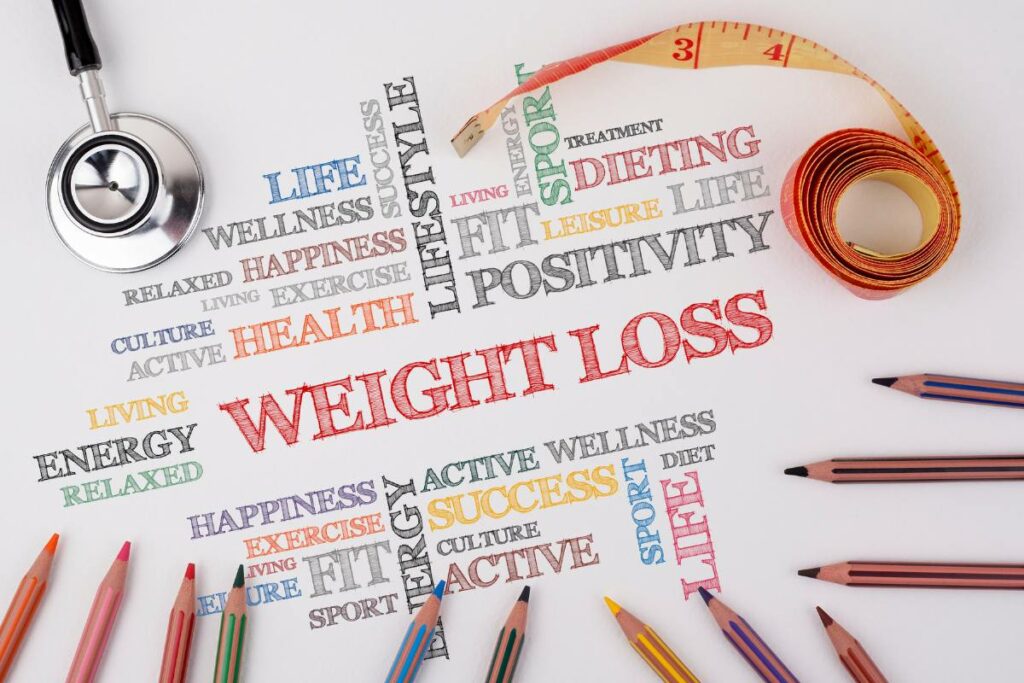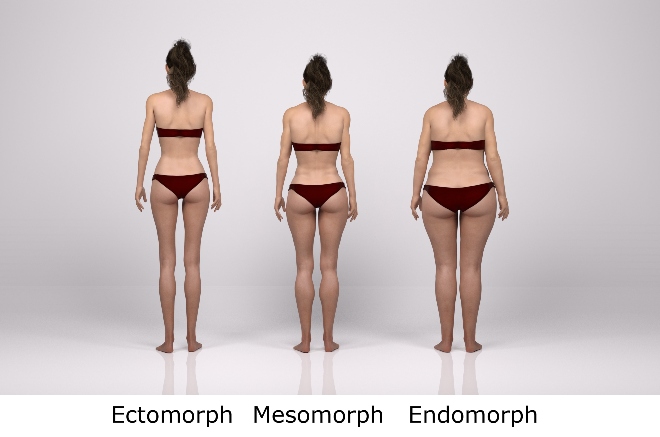Setting Realistic Weight Loss Goals: A Guide for Women
Let’s talk about setting realistic weight loss goals. We all know that shedding those extra pounds can sometimes feel like an uphill battle, but fear not!
With a little guidance and a positive mindset, we can achieve our realistic weight loss goals and feel amazing in our own skin.
So, grab a cup of tea, sit back, and let’s dive into the world of setting realistic weight loss goals.

This post may contain affiliate links, which helps keep this content free. Please read our disclosure for more info.
Approach Weight Loss with a Positive Mindset
Setting a realistic weight loss goal begins with the right mindset. It’s crucial to approach your weight loss journey with a positive and empowering mindset.
Instead of fixating on flaws or comparing yourself to unrealistic standards, it’s time to embrace your unique beauty and focus on improving your overall well-being.
Remember, your worth is not determined by a number on the scale or the size of your clothes.
This journey is about becoming the healthiest version of yourself, both physically and mentally. It’s about feeling confident, strong, and vibrant in your own skin.
So, let’s banish those unrealistic expectations and shift our focus to setting realistic weight loss goals that are tailored to our own bodies and lifestyles.

It’s important to understand that weight loss is not a linear process. There may be ups and downs along the way, and that’s completely normal.
Embrace the journey as a learning experience, a chance to discover what works best for your body and what makes you feel your best.
Instead of viewing weight loss as a punishment or a chore, reframe it as an act of self-care and self-love.
Choose nourishing foods that support your health and well-being, engage in enjoyable physical activities that make you feel energized and alive, and prioritize rest and recovery to honor your body’s needs.
By adopting a positive mindset, you’ll create a solid foundation for your weight loss journey.
Focus on the progress you make, celebrate your achievements, and don’t beat yourself up over occasional setbacks.
Remember, you’re on a path towards better health, and every step you take is a step in the right direction.
As you embark on your weight loss journey, practice self-compassion and kindness. Treat yourself with love and respect, both during the process and when you achieve your goals. Your worth goes far beyond the number on the scale or any external appearance.
Tailor Your Goals to Your Body and Lifestyle

One of the biggest mistakes people make when setting weight loss goals is falling for the allure of quick-fix solutions and empty promises. We’ve all seen those ads promising miraculous results overnight, but let’s be real—those are nothing more than marketing tactics.
The truth is, achieving lasting and realistic weight loss requires a personalized approach that takes into account your unique body and lifestyle.
Each person’s body is different, and factors such as genetics, metabolism, and overall health play a role in how we respond to weight loss efforts.
That’s why it’s essential to set goals that are realistic and attainable for you. Instead of aiming for drastic and unsustainable changes, focus on creating a plan that fits your body and lifestyle.
A key consideration when tailoring your goals is your metabolic type. Your metabolism is the process by which your body converts food into energy. It influences how efficiently you burn calories and can vary from person to person, and body type to body type.

Understanding your metabolic type can help you set realistic weight loss goals and develop strategies that work with your body’s natural processes.
Setting realistic weight loss goals that align with your body and lifestyle is the key to long-term success. By doing so, you can create a plan that is both attainable and sustainable.
It allows you to make gradual, healthy changes to your eating habits and physical activity levels, rather than resorting to extreme measures that can be detrimental to your overall well-being.
Remember, it’s not about comparing yourself to others or trying to achieve some arbitrary ideal. This journey is about improving your health and feeling your best.
Seek Professional Advice for a Healthy Start

Consulting with a healthcare professional or a registered dietitian can provide you with valuable insights and guidance tailored specifically to your needs, giving you a healthy and informed start.
These experts have the knowledge and expertise to assess your current health status, activity level, and dietary requirements.
By understanding your unique circumstances, they can provide personalized advice and recommendations that will set you on the path to success.
A healthcare professional or registered dietitian will consider various factors when helping you set realistic weight loss goals. They will take into account your medical history, any existing health conditions, and medications you may be taking.
This comprehensive understanding ensures that the goals you set are safe and appropriate for your body and circumstances.
Seeking professional advice doesn’t mean you lack the ability to make decisions for yourself. Rather, it empowers you with the knowledge and guidance necessary to make informed choices.
It’s a proactive step that sets a solid foundation for your weight loss journey, increasing your chances of achieving your goals safely and sustainably.
Related Article: Your Guide to Sustainable Weight Loss: Why It Matters and How to Ace It
Celebrate Non-Scale Victories Along the Way

When it comes to measuring progress on your weight loss journey, it’s important to remember that success extends beyond the numbers on the scale.
While weight is one measure of progress, it’s equally crucial to celebrate the non-scale victories that come along the way.
These victories encompass a range of indicators, such as how your clothes fit, your energy levels, and how you feel overall.
By shifting your focus to these non-scale victories, you’ll stay motivated, encouraged, and inspired on your path towards achieving your realistic weight loss goals.
One of the most empowering non-scale victories to celebrate is the way your clothes fit.
As you progress on your journey, you may notice that your clothes feel looser or that you’re able to comfortably wear items that were once tight or uncomfortable.
This is a clear indication that positive changes are happening in your body, and it’s something to be proud of.
Take a moment to celebrate by treating yourself to a new outfit or by rediscovering items in your wardrobe that now fit beautifully.
Another non-scale victory to celebrate is the improvement in your energy levels. As you engage in regular physical activity and adopt a balanced, nourishing diet, you’ll likely experience a boost in energy and overall vitality.
You may notice that you feel less sluggish, more alert, and able to tackle your daily activities with renewed vigor.

Celebrate this increased vitality by engaging in activities you love, such as taking a hike, dancing, or participating in a sport that brings you joy.
How you feel overall is another important non-scale victory to acknowledge and celebrate. As you make positive changes to your lifestyle, you may experience improvements in your mood, self-confidence, and overall sense of well-being.
Pay attention to the positive shifts in your mental and emotional state. Celebrate by engaging in self-care activities that nurture your mind and spirit, such as practicing mindfulness, journaling, or treating yourself to a spa day.
By focusing on these non-scale victories, you shift your mindset from solely relying on the number on the scale to embracing a holistic view of success.
Celebrating these victories helps you stay motivated and encourages a positive relationship with your body and the weight loss journey itself.
It’s a reminder that weight loss is not just about the destination but also about the positive changes you experience along the way.
Embrace a Balanced Approach to Eating

When it comes to achieving realistic weight loss goals, healthy eating plays a pivotal role.
However, it’s important to remember that healthy eating is not about depriving yourself of the foods you love. Instead, it’s about nourishing your body with wholesome, nutrient-dense foods that support your overall well-being.
To create a balanced approach to eating, it’s crucial to incorporate a variety of food groups into your meals.
Start by focusing on filling your plate with plenty of fruits and vegetables. These colorful powerhouses are packed with essential vitamins, minerals, and antioxidants that support your health and help you feel satisfied.
Next, prioritize lean proteins. Incorporate sources such as skinless poultry, fish, lean beef, and tofu into your meals. Protein helps keep you feeling full and supports muscle growth and repair, which is essential for a healthy body composition.
Whole grains should also have a prominent place in your diet. Opt for brown rice, quinoa, and oats, which provide a good source of fiber and nutrients. Fiber promotes satiety, aids in digestion, and helps maintain stable blood sugar levels.
Don’t forget about healthy fats! Include sources such as avocados, nuts, seeds, and olive oil in your meals. These fats provide essential fatty acids that support brain function, help absorb fat-soluble vitamins, and promote a feeling of fullness.

While focusing on incorporating these nutritious foods, it’s important to practice portion control.
Pay attention to your body’s hunger and fullness cues, and aim to eat until you’re comfortably satisfied, not overly stuffed. Be mindful of your portion sizes, as eating too much of even healthy foods can hinder your weight loss progress.
In addition to eating a balanced diet, staying hydrated is crucial for overall health and weight loss.
Make sure to drink water throughout the day to maintain proper hydration. Water not only aids in digestion but also helps control appetite and supports the body’s natural detoxification processes.
Remember, adopting a balanced approach to eating is a long-term lifestyle change rather than a short-term diet. It’s about making sustainable choices that you can maintain over time.
Allow yourself to enjoy occasional indulgences in moderation, as long as the majority of your meals consist of nutrient-dense foods.
To support your journey towards realistic weight loss goals, consider meal planning and preparation. This allows you to have nutritious meals and snacks readily available, reducing the temptation to rely on less healthy options when you’re pressed for time.
Lastly, listen to your body. Pay attention to how certain foods make you feel. Notice the impact of different foods on your energy levels, digestion, and overall well-being.
Everyone’s body is unique, so it’s important to find what works best for you.
Find Joy in Physical Activity

Exercise doesn’t have to be a tedious chore. In fact, finding joy in the activities you choose can make all the difference.
By discovering physical activities that bring you genuine joy and excitement, you’ll be more motivated to move your body and make exercise a regular part of your routine.
The first step is to explore different activities and find what resonates with you. Think about the things you enjoy and consider how they can be incorporated into your exercise routine.
If you love dancing, why not try a dance class or join a dance fitness program?
If you enjoy nature, hiking or outdoor yoga might be your perfect fit. If you love being in the water, swimming or water aerobics can be great options.
The key is to find activities that ignite your passion and make you eager to move.
There is no one-size-fits-all approach to exercise. What works for someone else may not necessarily work for you.
The goal is to discover activities that you genuinely enjoy and that align with your interests and preferences. This way, exercise becomes something to look forward to rather than a dreaded obligation.
Aim for at least 150 minutes of moderate-intensity exercise each week, as recommended by health guidelines. But don’t get caught up in thinking that you need to do it all at once.
Every little bit counts! If finding a full 30-minute block of exercise is challenging, break it down into shorter sessions throughout the day.
Take a 10-minute walk in the morning, dance to your favorite music for 15 minutes in the afternoon, and do a quick bodyweight workout in the evening.

By splitting your exercise into manageable chunks, you’ll still reap the benefits and stay consistent.
Variety is also key to staying motivated and preventing exercise from becoming monotonous. Mix up your activities to keep things interesting.
Try different classes, explore new trails, or engage in a range of exercises that target different muscle groups.
Not only will this prevent boredom, but it will also challenge your body in new ways and help you achieve a well-rounded level of fitness.
Remember, the ultimate goal is to create a sustainable exercise routine that becomes a lifelong habit.
By finding joy in physical activity, you’ll be more inclined to stick with it and make it a regular part of your lifestyle. Make it a priority to schedule your exercise sessions and treat them as non-negotiable appointments with yourself.
And of course, don’t forget to listen to your body. It’s important to find the balance between pushing yourself and respecting your limitations.
Be mindful of any discomfort or pain and adjust your activities accordingly. Rest when needed, and don’t be too hard on yourself if you miss a day or have a lower-intensity workout. The key is consistency over time.
Rest and Recovery Are Essential

In the pursuit of achieving realistic weight loss goals, it’s important not to overlook the importance of rest and recovery. Your body needs time to recuperate and repair from the physical stress of exercise.
Incorporating rest days into your fitness routine is crucial for maintaining overall health and optimizing your progress.
By listening to your body’s cues and finding a healthy balance between activity and rest, you’ll set yourself up for long-term success in achieving your weight loss goals.
Scheduling regular rest days is key to allowing your body to recharge and repair itself. During periods of rest, your muscles rebuild and strengthen, and your energy stores replenish.
Without adequate rest, you risk overtraining, which can lead to decreased performance, increased risk of injury, and hindered progress in your weight loss journey.
Listen to your body’s signals and avoid overexertion. Pay attention to feelings of excessive fatigue, muscle soreness that persists for several days, or a decrease in performance.
These are signs that your body needs rest. It’s essential to honor these signals and give yourself permission to take a break.
Remember, rest is not a sign of weakness, but rather a crucial component of a well-rounded fitness routine.
Rest and recovery also extend beyond physical rest. Emotional and mental well-being play a significant role in achieving realistic weight loss goals.
Taking time for self-care activities can help reduce stress, improve sleep quality, and enhance overall mental resilience.
Engage in activities that promote relaxation and rejuvenation, such as meditation, deep breathing exercises, spending time in nature, or indulging in a hobby you love.

Prioritizing self-care is an integral part of maintaining a healthy mind-body balance.
Finding a healthy balance between activity and rest is different for everyone. It’s important to listen to your body’s unique needs and adjust your routine accordingly.
Some individuals may require more frequent rest days, while others may find that active recovery activities, such as gentle stretching or low-intensity activities like yoga or walking, work well for them on rest days.
Be mindful of your sleep patterns. Aim for quality sleep of around 7-9 hours per night, as it is essential for recovery and overall well-being.
Establish a bedtime routine that promotes relaxation and good sleep hygiene, such as avoiding screens before bed, creating a comfortable sleep environment, and practicing relaxation techniques.
By incorporating rest and recovery into your fitness routine, you allow your body to adapt, heal, and grow stronger. This, in turn, enhances your performance during exercise and supports your weight loss goals.
Progress is not solely determined by how much you do but also by how well you recover.
Related Article: 10 Scientific Health Benefits of Sleep + Tips to Sleep Better
Establish a Supportive Network

Your journey towards realistic weight loss goals becomes easier and more enjoyable when you have a support system in place.
Surrounding yourself with positive and encouraging individuals who uplift and motivate you can make all the difference, especially during challenging times.
Building a support network provides you with a sense of community, accountability, and a source of inspiration to help you stay on track towards achieving your weight loss goals.
One of the most effective ways to establish a supportive network is by finding a workout buddy. Partnering up with someone who shares similar goals can make exercising more fun and engaging.
Whether it’s a friend, family member, or colleague, having a workout buddy provides companionship during workouts, increases motivation, and adds an element of friendly competition.
You can encourage and challenge each other, celebrate milestones together, and keep each other accountable.
In addition to a workout buddy, consider joining a community group or fitness class. These groups often bring together individuals with similar interests and goals, creating a supportive and inclusive environment.

Participating in group activities not only provides an opportunity to meet new people but also offers a chance to engage in shared experiences and exchange valuable tips and advice.
The camaraderie and encouragement within these groups can be a significant source of motivation and inspiration throughout your weight loss journey.
If in-person groups aren’t accessible or don’t align with your schedule, virtual communities and online forums can be an excellent alternative.
The internet offers a vast array of platforms where you can connect with like-minded individuals, share your experiences, and gain insights and support from others on similar journeys.
Engaging in these online communities allows you to ask questions, share victories and struggles, and find motivation and encouragement from individuals who truly understand the challenges you may be facing.
Remember, a supportive network isn’t just about finding people who cheer you on; it’s also about being part of a reciprocal relationship where you offer support to others as well.
By sharing your experiences, providing encouragement, and celebrating the successes of others, you contribute to the positive and uplifting atmosphere of the community.
Together, you can overcome obstacles, celebrate victories, and find solace in knowing that you’re not alone on your weight loss journey.
Ready to Set Realistic Weight Loss Goals?
Setting realistic weight loss goals is a journey that requires a positive mindset, tailored approaches, and a supportive network.
By embracing your unique beauty, setting personalized goals, seeking professional advice, celebrating non-scale victories, nourishing your body, finding joy in physical activity, prioritizing rest and recovery, and establishing a support system, you’ll be well on your way to achieving your realistic weight loss goals.
But hey, if you’re looking for a little extra support and guidance to kickstart your journey, I’ve got just the thing for you—the 21-Day Fat Loss Challenge program!

This incredible program offers a structured approach to healthy eating and lifestyle habits. It provides you with eating plans, workout routines, and a supportive community of individuals on similar journeys.
The program helps you establish healthy habits, offers guidance, and gives you the tools you need to achieve your weight loss goals.
Are you ready to take the leap and join the 21-Day Fat Loss Challenge?
Remember, you’ve got what it takes to make a positive change in your life. Set those realistic weight loss goals, embrace the journey, and let the 21-Day Fat Loss Challenge program be your guide.
Get ready to transform your body, your mindset, and your overall well-being. The journey starts now, and I’m cheering you on every step of the way!


Great article! I appreciate the emphasis on setting realistic weight loss goals. It’s important to approach weight loss healthily and sustainably rather than striving for quick fixes or unrealistic expectations. This article provides practical tips and guidance for women looking to achieve their weight loss goals in a balanced manner.
Thanks, Zara! Glad you enjoyed it!